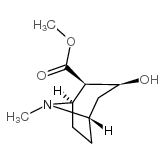| Structure | Name/CAS No. | Articles |
|---|---|---|
![methyl phenyl 8-azabicyclo[3.2.1]octane-2,3-dicarboxylate Structure](https://image.chemsrc.com/caspic/471/61585-22-6.png) |
methyl phenyl 8-azabicyclo[3.2.1]octane-2,3-dicarboxylate
CAS:61585-22-6 |
|
 |
ecgonine methyl ester
CAS:7143-09-1 |